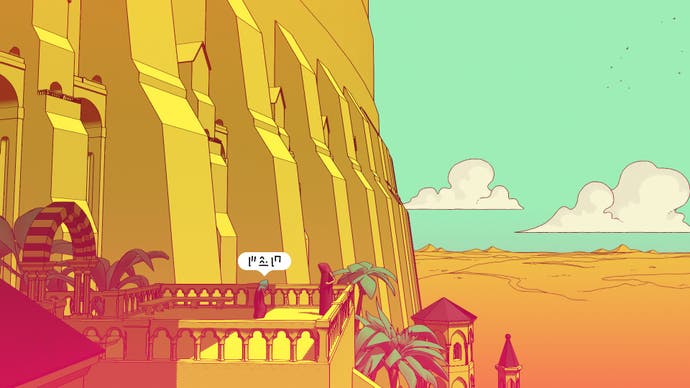Chants of Sennaar review - a puzzling linguistic marvel
Champollion's league.
High up the tower - but still nowhere near the top - I discovered the bell-ringer's shack. The shack was actually a sort of stone hut, if such a thing is possible, sat at the end of a curving wall. There was a door and a few slotted windows, and if I walked to the right, I found the bell-ringing equipment, which I needed to use but could not yet understand.
Would the bell-ringer help me? Looking through the slotted window, I could see him, or rather his muttering shadow, ignoring my banging on the door, willing me to go away. How to get him out here to chat?
The answer - the first part of the answer anyway - lay with red graffiti slapped on the wall of his house. Three symbols, which meant three words, by the looks of it. If only I could read them.
Chants of Sennaar is often like this, an objective nested inside a puzzle nested inside an enigma. At first glance it all looks impossible, but this is a game for your inner watch-maker, and it requires you to tweezer each problem apart, one tiny cog or spring at a time. Take them out. Line them up. See what they suggest.
Wrong analogy probably. Chants is a game about climbing the Tower of Babel and making sense of the various peoples you meet as you work your way higher. It's an adventure game, generally sort of isometric, with pointing and clicking and the solving of those nested puzzles. All quite traditional, written down like that. But I needed to remind myself that this is the actual genre from time to time, because the game often feels nothing like it. It feels like a revelation, actually, like games have worked out how to do something elegant, impossible, and empowering.
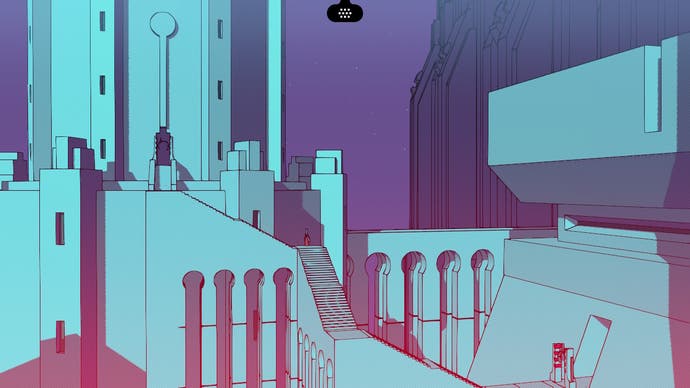
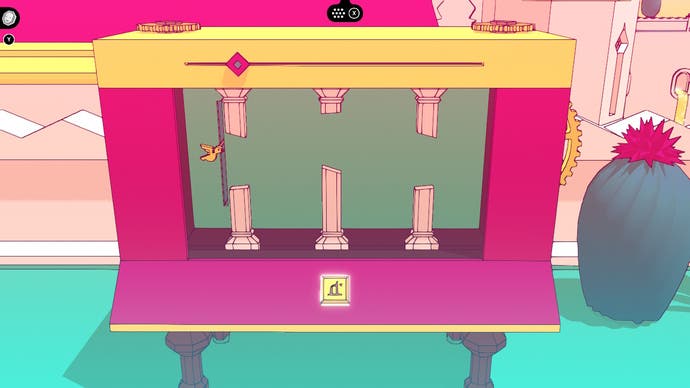
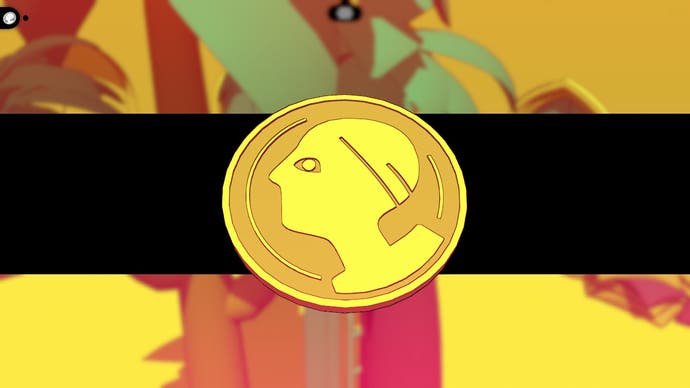
That's because, since this is Babel, the real task is translation. Progress, puzzles, simple human curiosity, all of this comes down to collecting the marks you see as you move around the world and then working out what they mean. Astonishingly - Babel, remember - Chants doesn't do this once but several times over. You solve one language and then move higher up the tower: a new group of people, a new language to decode, new customs and rituals and ways of being in the world. What a game this is.
Chants' languages are logograms (logographs? lexigraphs?), or written languages in which each symbol stands for a word. I had to google this, so who knows if I'm right. Anyway, it means that you can build meaning in chunks, like a Lego wall made of brightly coloured bricks. And working out what the individual words behind each symbol are is part of the purest delight on offer here.
You tease these words out in many different ways, using many different contexts, hoping for the pincer movement. First word in a conversation - maybe that's the greeting? Maybe the person's pointing at something as they speak? Maybe a word is written high on the wall of a foreboding building. Maybe it's next to machinery. Maybe you're listening in as people are instructed in a task, picking up rocks, loading them, sending them on their way. However you come across them, the game collects your word symbols in a notebook you can open at any time. You can highlight a symbol and type in your best guess at what the word is. Then the game will start using this word you've typed in potential translations of speech. Does it still feel correct?
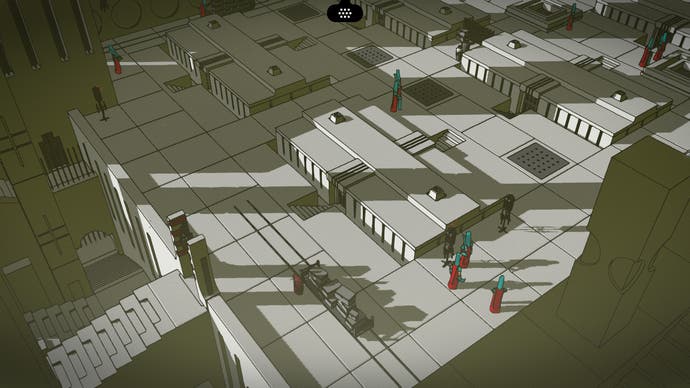
At this point it's all still speculation. Clarity comes when the game has decided that you've seen enough to have a proper stab at what a definition is. At this point your notebook presents a series of pictures of things that you've encountered: objects, locations, actions, expressions. You slot the symbols correctly next to the images - this in itself requires an additional level of interpretation - and once the right symbol is next to the right image in every case on that page, you get the official translation. You've learned some of the language!
From there, repeat, which means explore further, chat to more people, investigate more machines, get lost in more mazes, and solve more puzzles. Progress through the opening of doors, the manipulation of peoples and objects. Go higher! Because this is Babel! And because this is an adventure game.
Fittingly, given the theme, there are touchstones for all of this. It's possible to slice and dice the game's possible inspirations and place it in an interesting context, in the same way that you slice and dice meaning as you home in on a definition. Firstly, there's Heaven's Vault, another game that saw you decoding a language, although the degree of nuance, of shifting meaning and necessary archaeology is very different here: this feels much more arcadey, if such a thing is possible. Then there's Obra Dinn, which also used the same kind of Sudoku reasoning as you triangulated context to work out the missing pieces of information you were after - and which used a notebook and the rule of three to confirm correct deductions.

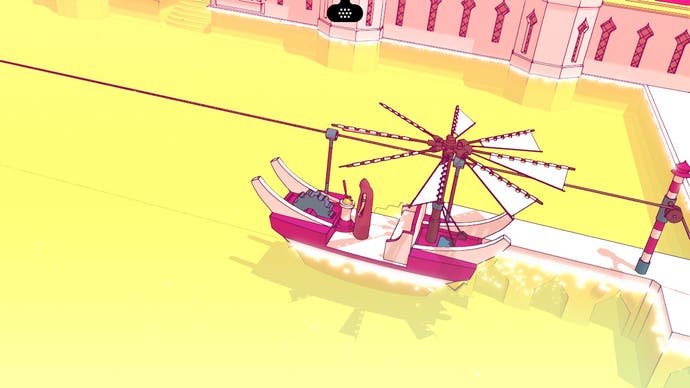
All of this, but for me Chants really reminds me of those weird, improbable, genre-breaking games you'd get on something like the Amiga: Captain Blood, Another World. These were games that pushed the form of games in their subject matter, in their cinematic handling of story, in their love of the kind of details that games have always tended to ignore. There's a moment in Another World where you're standing high above an enemy and you have to intuit their position through the warped reflections in some glass globes strung from the ceiling. It felt like nothing else in the digital on/off world of games at the time. Chants is filled with this stuff too. I will watch and rewatch a conversation, seeing the symbols scroll past but also trying to understand the movements of the person speaking. I will move a lit flame around a room and study the walls for the shadows it casts. Later on, I'll explore increasingly complex spaces where each room feels like part of the same idea, the same machine.
All of this invention is matched to an art style that constantly surprises. In screenshots, Chants can look a bit like Sable, say, that brilliant open-world game about finding your place in the world. But Sable's thin lines are not the same as Chants' thin lines, which are used in a fierce, architectural style, rendering smooth walls and finials and turrets, shifting from North Africa one moment to Dickens' London the next as the warm colours strobe through various cocktails, strobing from sandstorm yellow and sunset reds to wine-dark purples and irradiated peach, all of it backed by a spry, playful score.
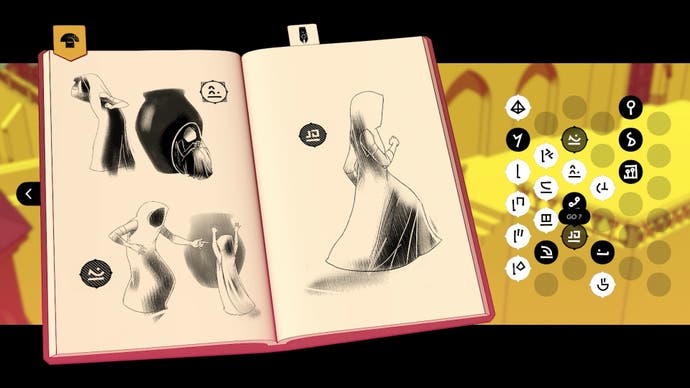
The more I played, the more I retreated to the simplest levels, though. For me, Chants of Sennaar lives on the scale of individual words, as the languages flicker and replace one another, one looking like Jean Miro doodles, another resembling Feynman diagrams.
It's not just the look of the words, it's the possibility space around them. It's a fascinating moment when you lock the symbols in correctly and you see the distance between your own guess at a word and the game's final definition. Mirror turns out to be beauty. Lute turns out to be bard. All misunderstandings of synecdoche, really. But drunk turns out to be idiot. At one moment, God turned out to be Fortress. This is a game with a lot to say, and interesting ways to say it all.
And it all builds, as a game about a tower should, and the sheer thrill of getting your head around all these individual scripts, reaching again and again the tipping point between being mostly confused and mostly in control, leads to one of the more euphoric endings in recent games. What a fascinating, thoughtful game this is. How challenging. How illuminating. Like any good language, it's a tool, and also a means of reflecting on the things that happen in the wordless mazes of the mind.
